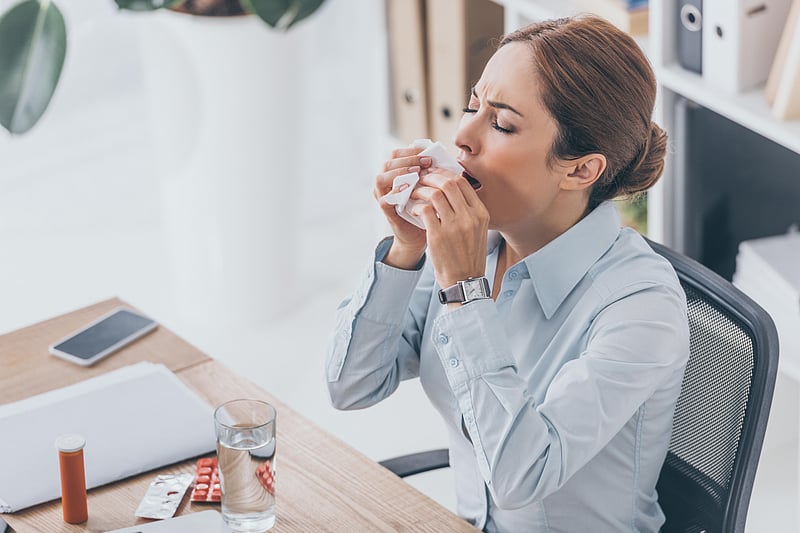Get Healthy!

- Denise Mann
- Posted January 26, 2023
About 1 in 3 American Adults Has an Allergy
If it seems as though everyone you know struggles with some sort of allergy, new research suggests you are not mistaken.
As many as 1 in 3 adults and 1 in 4 kids suffers from a seasonal allergy, a food allergy or eczema, the latest government data shows.
Caused by a reaction to plant pollen, seasonal allergies were most common type of allergy in both kids and adults. Symptoms include sniffling, sneezing, coughing and itchy eyes.
The study wasn't designed to see if allergies are on the rise. Still, these conditions have become more prevalent according to previous reports, said study author Benjamin Zablotsky, a health statistician at the U.S. Centers for Disease Control and Prevention.
About 19% of children and nearly 26% of adults were diagnosed with a seasonal allergy in 2021.
Slightly more than 7% of adults have eczema, and 6.2% have a food allergy, the new survey showed. Seasonal allergies were more common in white adults, while Black adults were more likely to have a food allergy.
Among kids, nearly 11% had eczema, and nearly 6% had a food allergy. Eczema is more common among kids aged 6 to 11, and Black children are more likely to have a food allergy.
The new reports are designed differently from previous ones. Instead of asking about self-reported allergies, the researchers asked about doctor-diagnosed allergies. It's also the first time they looked at allergies in adults, so it's not possible to see how the rates in adults may have changed over time.
Both reports are published in the Jan. 2023 issue of the CDC's National Center for Health Statistics Data Brief.
Experts said they are seeing more allergies than ever before, but they pointed out that treatment is also improving.
Climate change may be driving the increase in allergies, said Dr. Praveen Buddiga, a clinical assistant professor of medicine at the University of California, San Francisco.
"Year after year, we see drought conditions and higher temperatures leading to situations such as forest fires; the winters also have become significantly colder or freezing and longer,"he said. "This leads to an earlier [and more extended] seasonal allergy season, and the colder/freezing season [is] more significant yearly [and] leads to drier skin conditions, or more favorable towards eczema."
The good news is that doctors are getting better at treating seasonal allergies with allergy shots, said Buddiga.
"Food allergies are still a challenge," he said. Sometimes peanut allergies get better over time, but that is not the case with other food allergies.
If you think you may have allergies, see an allergist for allergy skin testing, said Dr. Mark Jacobson, medical director of Allergy & Asthma Physicians in Hinsdale, Ill.
Medications such as intranasal steroids and taking steps to avoid exposure can help.
If you have seasonal allergies, keeping the windows shut and running the air conditioning can help keep offending pollen out of your home.
"The focus should always be on the bedroom since patients spend a third of their life in their bedroom or more,"Jacobson said.
"If avoidance measures and medication are not enough, then allergy shots are an option," he said. "With this treatment, the patient is given a small amount of the actual thing they are allergic to [that is] slowly increased over time so that the immune system learns to ignore these allergens, rather than overreacting to them."
Dr. Peter Lio, a clinical assistant professor of dermatology and pediatrics at Northwestern University Feinberg School of Medicine in Chicago, said he is seeing a tremendous number of allergic patients in his practice.
It seems that there has been an increase over prior decades, though it is not clear why, Lio said.
Chemicals and pollutants in the environment can damage your skin, gut and lung barriers, and "once damaged, allergens can enter into our bodies in an abnormal way and are more likely to cause allergic sensitization," he explained.
There is good news on the eczema front, Lio noted. "We are better than ever at treating eczema and doing so with safer treatments, and we are now starting to talk about the concept of remission or getting people so much better that they can reduce or even stop some of their treatments," he said.
More information
The American Academy of Allergy, Asthma & Immunology has more on treating seasonal allergies.
SOURCES: Mark Jacobson, MD, medical director, Allergy & Asthma Physicians, Hinsdale, Ill.: Praveen Buddiga, MD, allergist, clinical assistant professor, medicine, University of California, San Francisco; Peter Lio, MD, clinical assistant professor, dermatology and pediatrics, Northwestern University Feinberg School of Medicine, Chicago; National Center for Health Statistics Data Brief, Jan. 26, 2023
